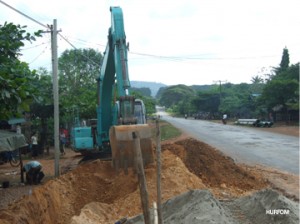Local people concerned about gas pipeline renovation
January 7, 2013
HURFOM: More than ten years ago, the construction of the 180-mile Yadana gas pipeline across the length of the southern peninsula of Burma, also called Myanmar, drew widespread condemnation for massive human rights violations. Branching off that controversial pipeline is a longer but lesser known gas line originating near Kanbauk in Tenasserim Region and ending in Myaing Kalay, Karen State. During its construction, over 2,400 acres of land were seized, for which villagers received little or no compensation.
 Now, sections of the 12-year-old pipeline are undergoing restoration. Certain portions are being dug up and repaired, while others are being moved across streets or fields to straighten the trajectory of the pipe. The original pipeline was constructed parallel to the Ye to Mawlamine railway, but the updated segments are often being laid closer to the motorway between Thanbyuzayat and Mudon. In recent interviews, residents of roadside villages like Youndaung, Neepado, Kwonhlar, and Waethon Chaung expressed fear about the encroaching project that runs in front of homes, shops, and a local school.
Now, sections of the 12-year-old pipeline are undergoing restoration. Certain portions are being dug up and repaired, while others are being moved across streets or fields to straighten the trajectory of the pipe. The original pipeline was constructed parallel to the Ye to Mawlamine railway, but the updated segments are often being laid closer to the motorway between Thanbyuzayat and Mudon. In recent interviews, residents of roadside villages like Youndaung, Neepado, Kwonhlar, and Waethon Chaung expressed fear about the encroaching project that runs in front of homes, shops, and a local school.
In its 2009 report “Laid to Waste,” HURFOM identified 10 major explosions that occurred along the Kanbauk to Myaing Kalay pipeline over its almost 10 years of operation, not including various leaks and minor problems. People described living near the pipeline like “sitting on a time bomb” due to the frequency of ruptures. With each explosion, villagers could be injured or asked to pay for pipeline repairs or area security. Military authorities regularly placed the blame for the blasts on rebel attacks, accusing local civilians of involvement. While rebel groups were sometimes responsible for attacks on state-controlled development projects, there was also strong evidence that the explosions were accidents caused by poor engineering and faulty welding on pipeline joints.
For these reasons, residents worry that resumed construction on the pipeline may lead to familiar hazards and financial burden.
“We were very anxious when we saw that the workers were laying the gas pipeline in front of our house. Although we wanted to tell them not to do it here, we couldn’t. They just continued to work and when there was a problem, they would not help us,” said one villager.
Pipeline modifications began in early November 2012 and are planned to improve worn-out sections and extend the flow of gas to Yangon, requiring the acquisition of previously unaffected land to bury new gas lines. Encouragingly, there have been no reports of forced labor since construction started. According to locals, construction workers are authorized to excavate land within 100 feet of the state-owned motorway, and the government has promised to compensate any land affected outside that boundary. In addition, while residents do not know the name of the private construction company managing the project, they said company representatives assured them that they would be compensated for seized land and would not have to pay for repairs like they did in the past.
But villagers claim they have been asked to provide sentry duty near the pipeline, equating the request to extortion because most locals end up paying authorities between 2,000 and 3,000 kyat to be excused from security detail. Also, property owners that have had land confiscated since November assert that, as of yet, they have not received compensation.
Nai Kyan Oung is from Youndaung Village and has cultivated his land for 60 years, after former generations tended the same plot. He said that many rubber and corn plantations located east of the village were buried under mud from the digging, but compensation has not arrived. After losing part of his property to a previous construction project, he said he does not expect compensation for the section of his corn plantation that now lies under upturned earth.
“In other countries, before setting up a pipeline, they train their workers and educate the local people to [prevent] frightening them. They take responsibility for the impact of the gas pipeline and compensate the people who have been affected. In my opinion, the government in our country should give assurances and [provide] clarification to the local people to calm their feelings toward the pipeline. I want the government to carefully review the project before they make a decision to implement such dangerous work,” said a local field reporter.
Comments
Got something to say?
You must be logged in to post a comment.



















































